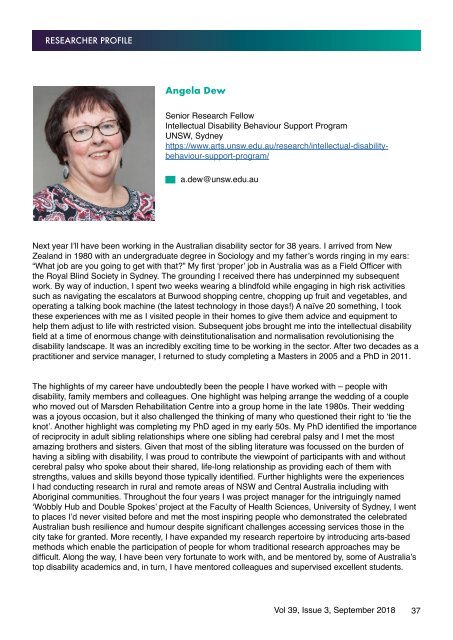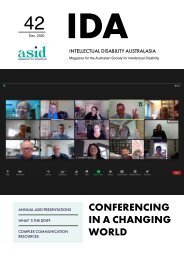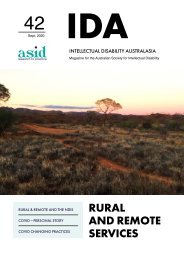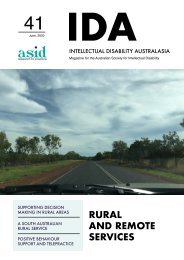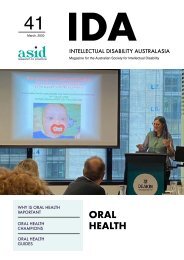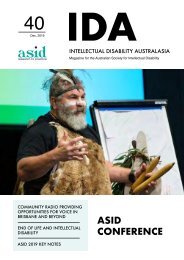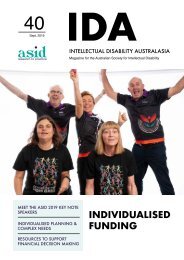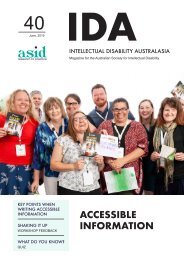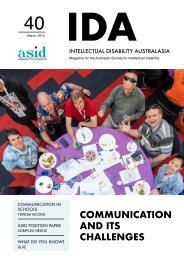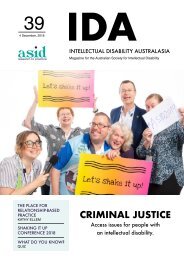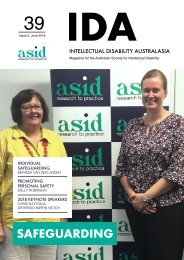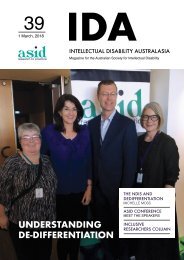IDA Magazine Vol 39 Iss 3 (Sept 2018)
Create successful ePaper yourself
Turn your PDF publications into a flip-book with our unique Google optimized e-Paper software.
RESEARCHER PROFILE<br />
Angela Dew<br />
Senior Research Fellow<br />
Intellectual Disability Behaviour Support Program<br />
UNSW, Sydney<br />
https://www.arts.unsw.edu.au/research/intellectual-disabilitybehaviour-support-program/<br />
a.dew@unsw.edu.au<br />
Next year I’ll have been working in the Australian disability sector for 38 years. I arrived from New<br />
Zealand in 1980 with an undergraduate degree in Sociology and my father’s words ringing in my ears:<br />
“What job are you going to get with that?” My first ‘proper’ job in Australia was as a Field Officer with<br />
the Royal Blind Society in Sydney. The grounding I received there has underpinned my subsequent<br />
work. By way of induction, I spent two weeks wearing a blindfold while engaging in high risk activities<br />
such as navigating the escalators at Burwood shopping centre, chopping up fruit and vegetables, and<br />
operating a talking book machine (the latest technology in those days!) A naïve 20 something, I took<br />
these experiences with me as I visited people in their homes to give them advice and equipment to<br />
help them adjust to life with restricted vision. Subsequent jobs brought me into the intellectual disability<br />
field at a time of enormous change with deinstitutionalisation and normalisation revolutionising the<br />
disability landscape. It was an incredibly exciting time to be working in the sector. After two decades as a<br />
practitioner and service manager, I returned to study completing a Masters in 2005 and a PhD in 2011.<br />
The highlights of my career have undoubtedly been the people I have worked with – people with<br />
disability, family members and colleagues. One highlight was helping arrange the wedding of a couple<br />
who moved out of Marsden Rehabilitation Centre into a group home in the late 1980s. Their wedding<br />
was a joyous occasion, but it also challenged the thinking of many who questioned their right to ‘tie the<br />
knot’. Another highlight was completing my PhD aged in my early 50s. My PhD identified the importance<br />
of reciprocity in adult sibling relationships where one sibling had cerebral palsy and I met the most<br />
amazing brothers and sisters. Given that most of the sibling literature was focussed on the burden of<br />
having a sibling with disability, I was proud to contribute the viewpoint of participants with and without<br />
cerebral palsy who spoke about their shared, life-long relationship as providing each of them with<br />
strengths, values and skills beyond those typically identified. Further highlights were the experiences<br />
I had conducting research in rural and remote areas of NSW and Central Australia including with<br />
Aboriginal communities. Throughout the four years I was project manager for the intriguingly named<br />
‘Wobbly Hub and Double Spokes’ project at the Faculty of Health Sciences, University of Sydney, I went<br />
to places I’d never visited before and met the most inspiring people who demonstrated the celebrated<br />
Australian bush resilience and humour despite significant challenges accessing services those in the<br />
city take for granted. More recently, I have expanded my research repertoire by introducing arts-based<br />
methods which enable the participation of people for whom traditional research approaches may be<br />
difficult. Along the way, I have been very fortunate to work with, and be mentored by, some of Australia’s<br />
top disability academics and, in turn, I have mentored colleagues and supervised excellent students.<br />
<strong>Vol</strong> <strong>39</strong>, <strong>Iss</strong>ue 3, <strong>Sept</strong>ember <strong>2018</strong><br />
37


